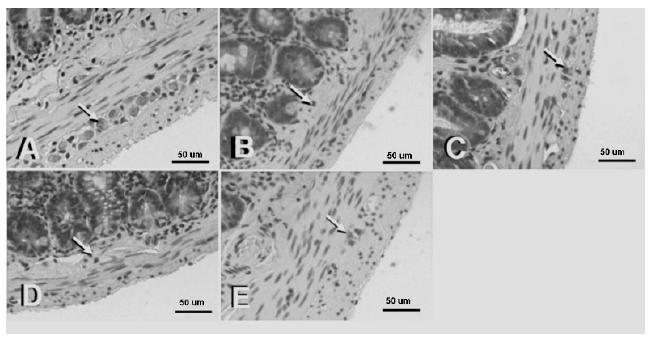Abstract
Purpose:
To analyze the effects of ischemic preconditioning (IPC) in the expression of apoptosis-related genes in rat small intestine subjected to ischemia and reperfusion.
Methods:
Thirty anesthetized rats underwent laparotomy and were drive into five groups: control (CG); ischemia (IG); ischemia and reperfusion (IRG); IPC and ischemia (IG+IPC); IPC and ischemia and reperfusion (I/RG+IPC). Intestinal ischemia was performed by clamping the superior mesenteric artery for 60 minutes, whereas reperfusion lasted for 120 minutes. IPC was carried out by one cycle of 5 minutes of ischemia followed by 10 minutes of reperfusion prior to the prolonged 60-minutes-ischemia and 120-minutes-reperfusion. Thereafter, the rats were euthanized and samples of small intestine were processed for histology and gene expression.
Results:
Histology of myenteric plexus showed a higher presence of neurons presenting pyknotic nuclei and condensed chromatin in the IG and IRG. IG+IPC and I/RG+IPC groups exhibited neurons with preserved volume and nuclei, along with significant up-regulation of the anti-apoptotic protein Bcl2l1 and down-regulation of pro-apoptotic genes. Moreover, Bax/Bcl2 ratio was lower in the groups subjected to IPC, indicating a protective effect of IPC against apoptosis.
Conclusion:
Ischemic preconditioning protect rat small intestine against ischemia/reperfusion injury, reducing morphologic lesions and apoptosis.
Key words:
Ischemic Preconditioning; Apoptosis; Mesenteric Ischemia; Reperfusion; Rats

